Unit 4 Body language Grammar 课件(36张PPT)
文档属性
| 名称 | Unit 4 Body language Grammar 课件(36张PPT) |
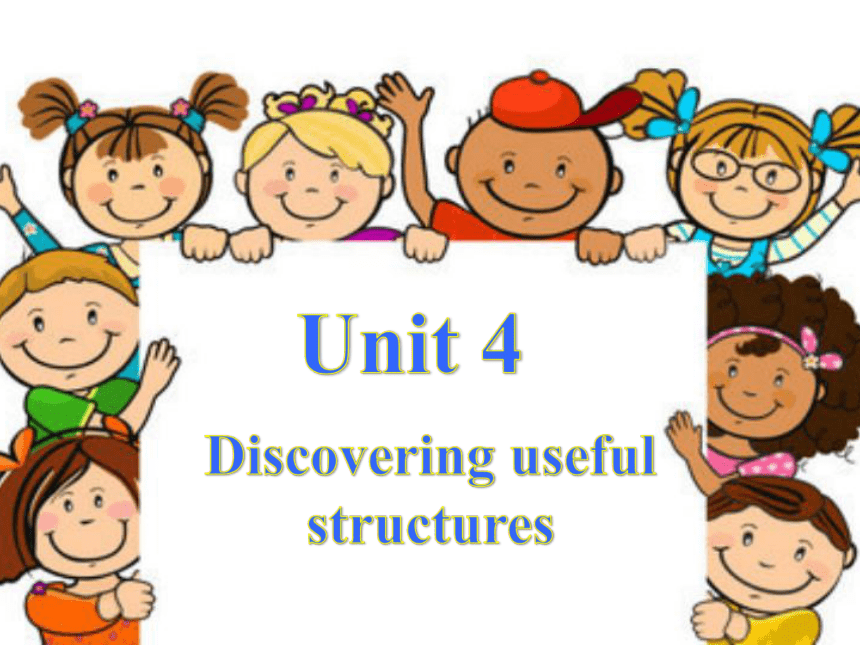
|
|
| 格式 | zip | ||
| 文件大小 | 1.3MB | ||
| 资源类型 | 教案 | ||
| 版本资源 | 人教版(新课程标准) | ||
| 科目 | 英语 | ||
| 更新时间 | 2019-11-16 00:00:00 | ||
图片预览

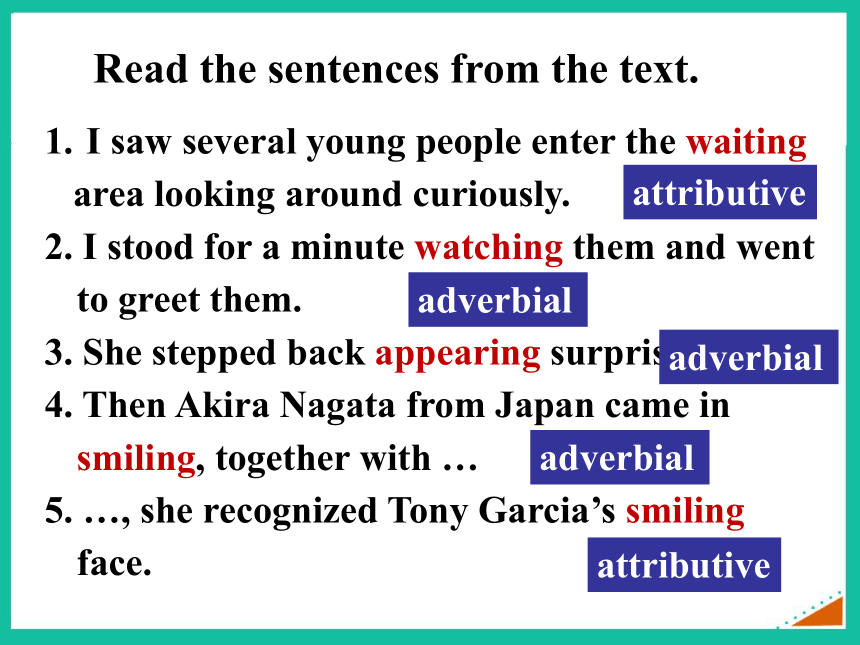
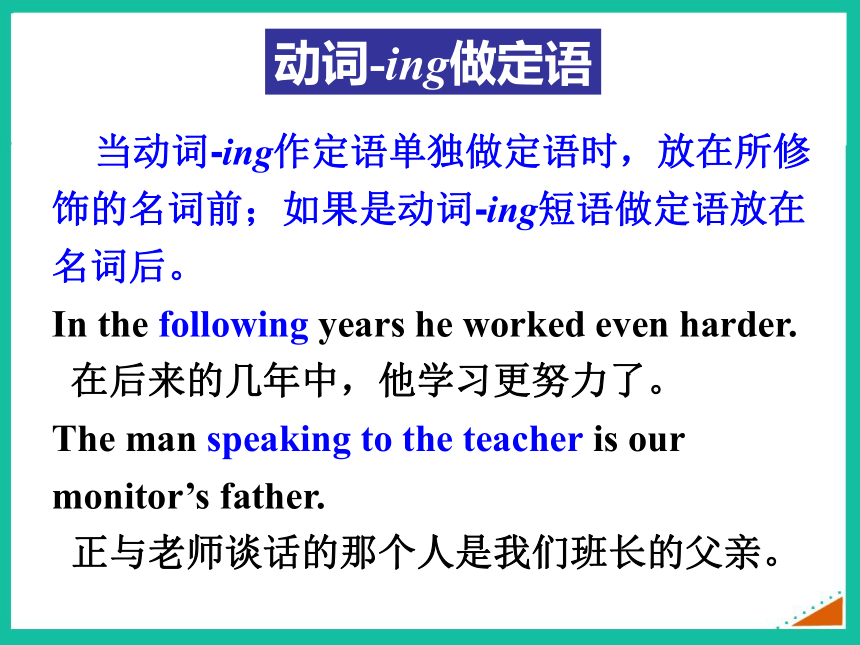
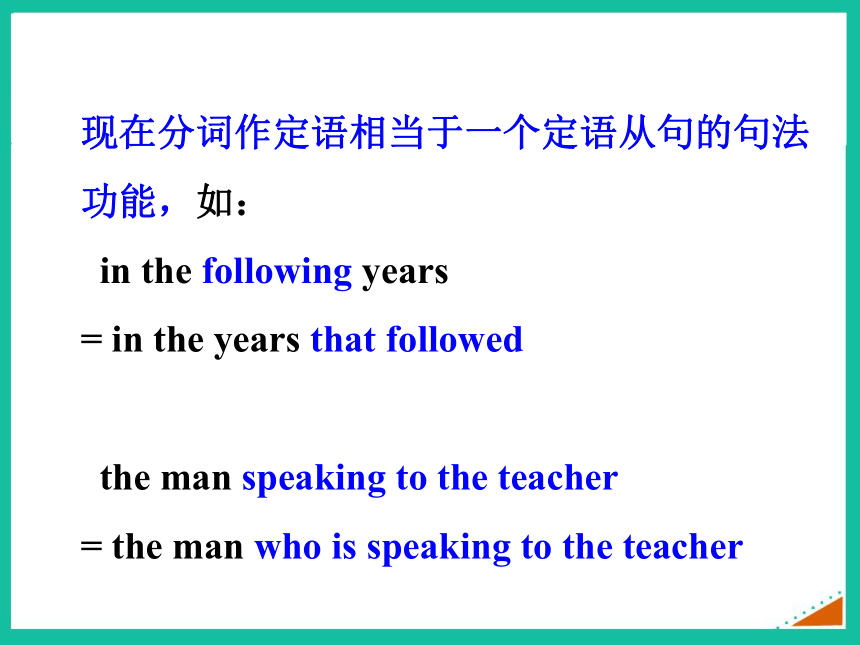
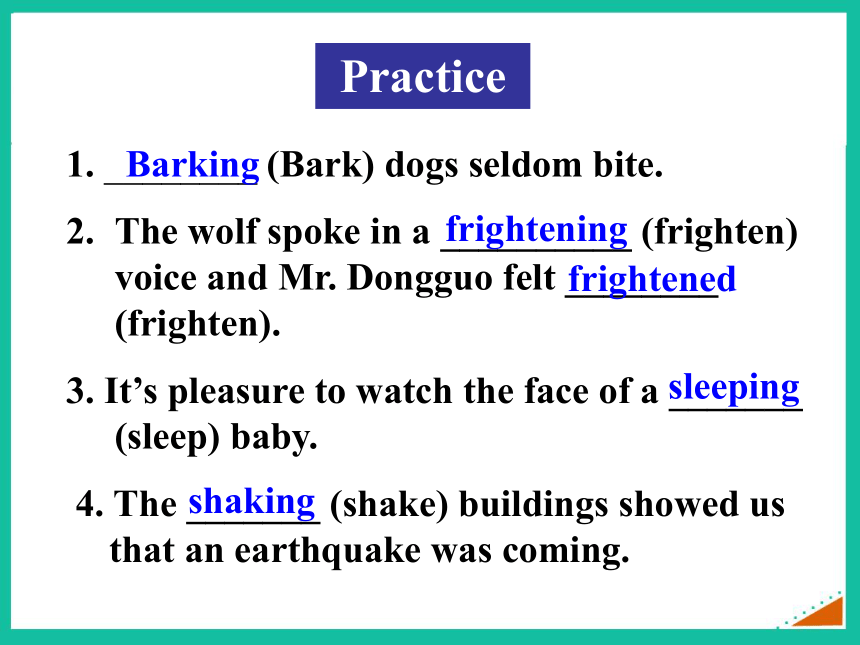
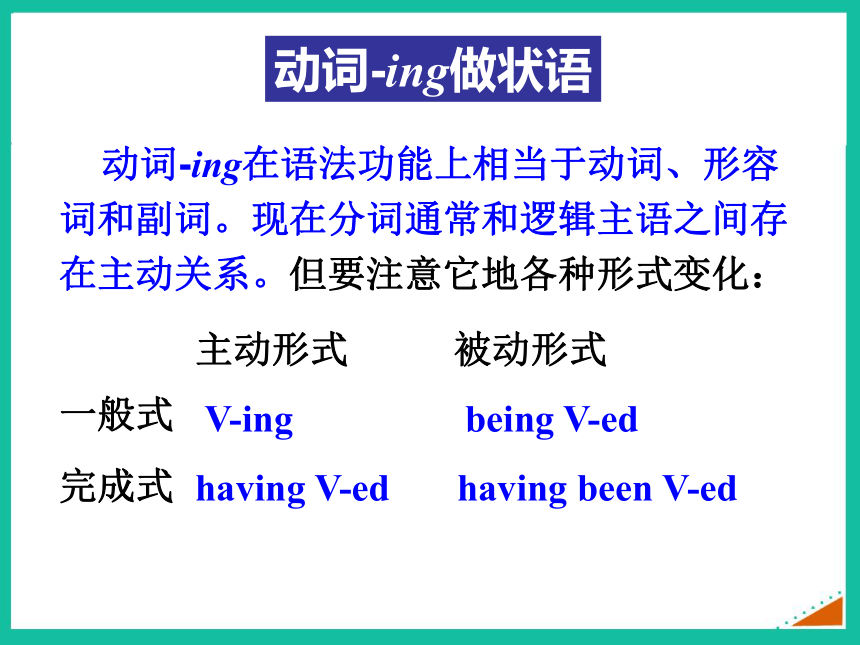
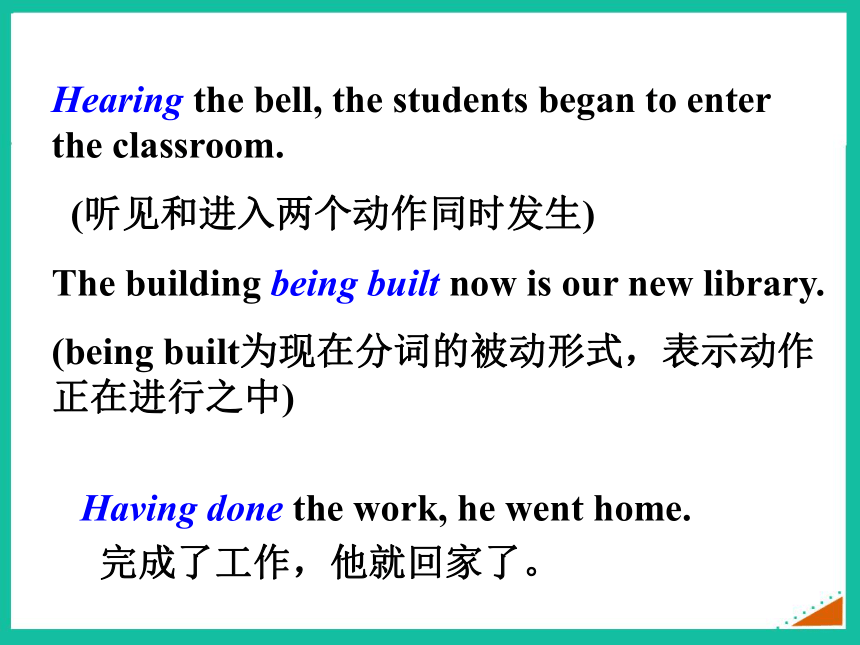
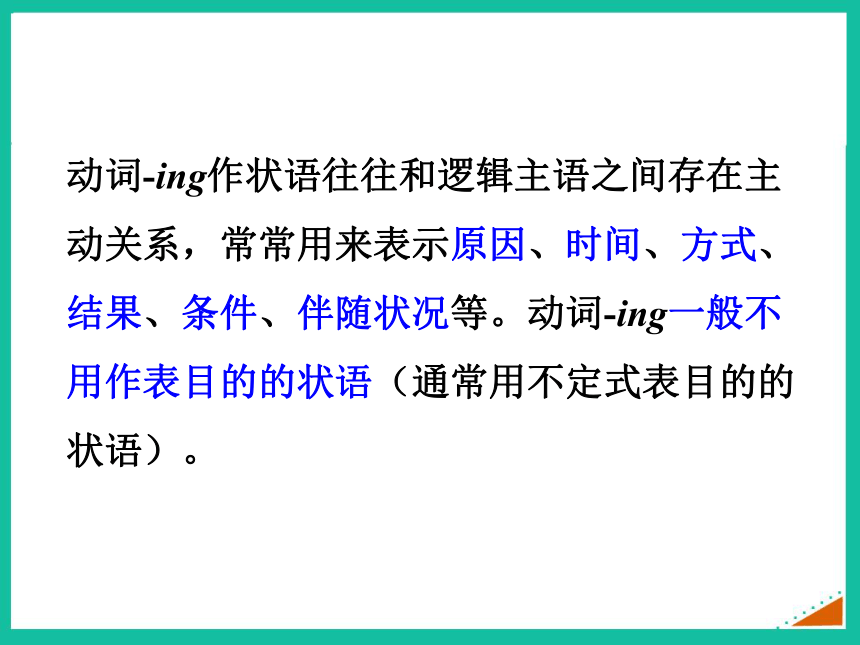
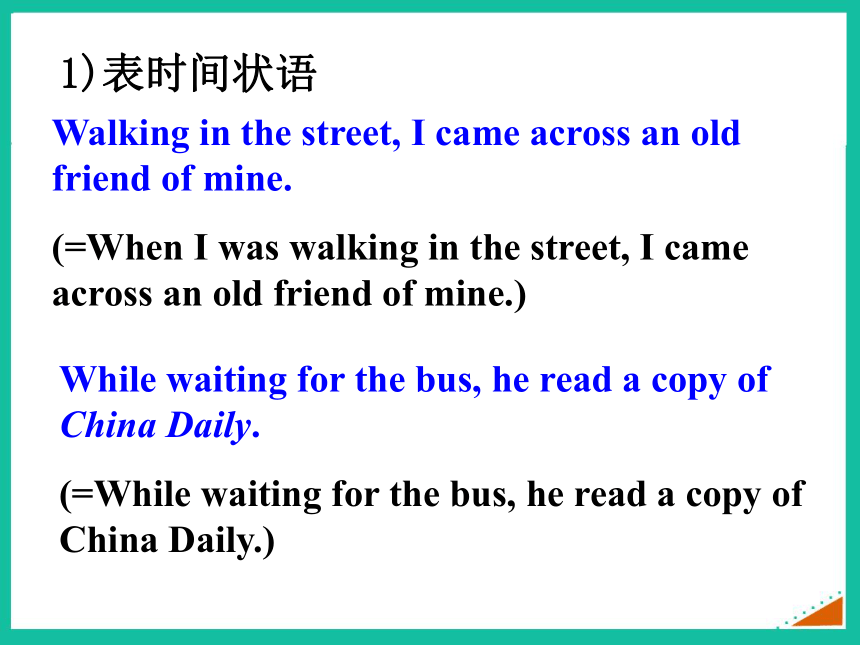
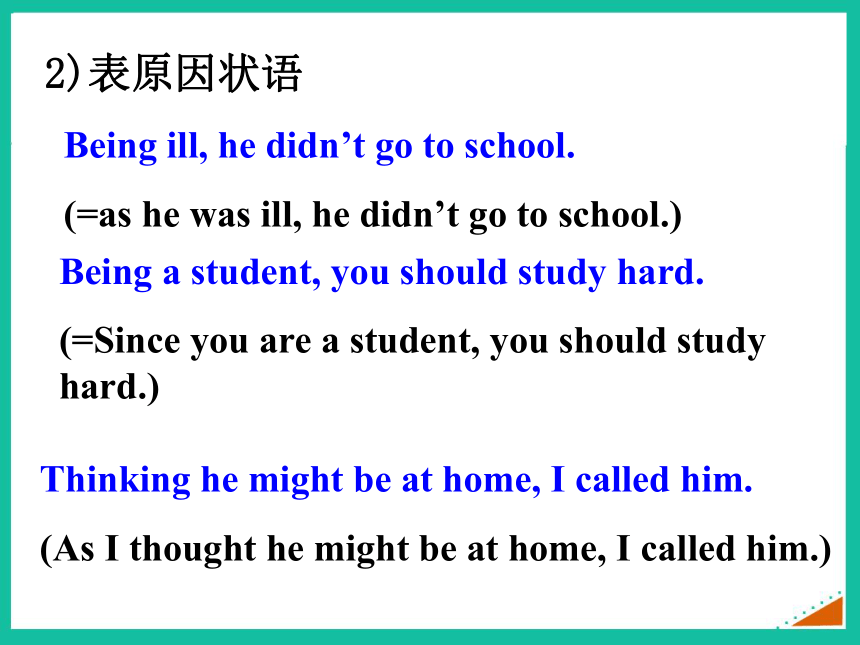
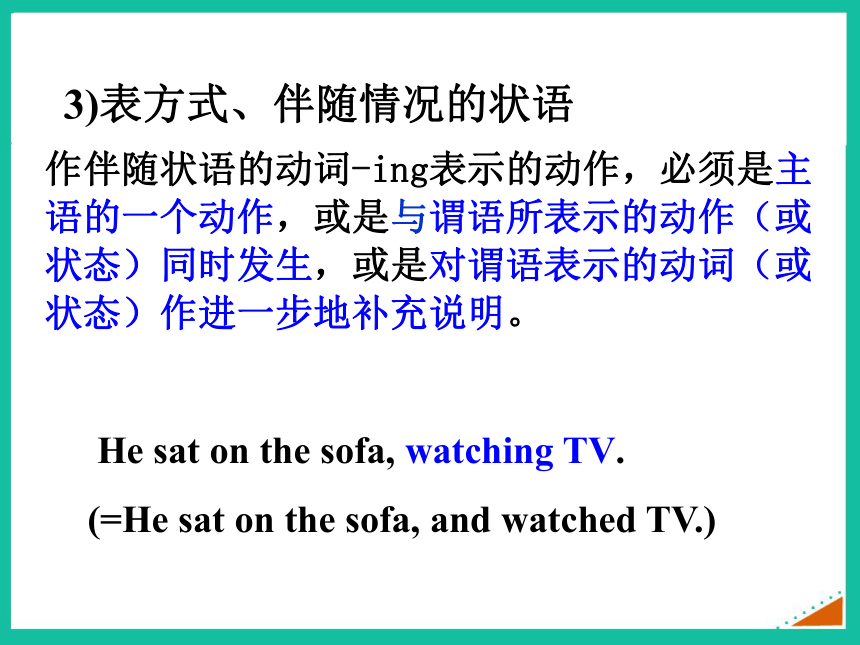
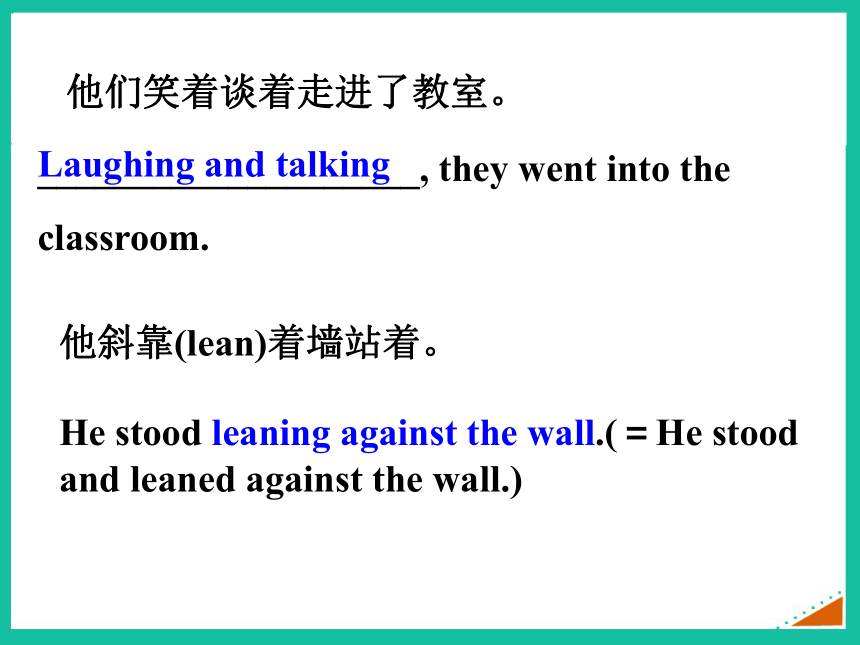
文档简介
(共36张PPT)
Read
the
sentences
from
the
text.
I
saw
several
young
people
enter
the
waiting
area
looking
around
curiously.
2.
I
stood
for
a
minute
watching
them
and
went
to
greet
them.
3.
She
stepped
back
appearing
surprised
…
4.
Then
Akira
Nagata
from
Japan
came
in
smiling,
together
with
…
5.
…,
she
recognized
Tony
Garcia’s
smiling
face.
attributive
adverbial
adverbial
adverbial
attributive
当动词-ing作定语单独做定语时,放在所修饰的名词前;如果是动词-ing短语做定语放在名词后。
In
the
following
years
he
worked
even
harder.
在后来的几年中,他学习更努力了。
The
man
speaking
to
the
teacher
is
our
monitor’s
father.
正与老师谈话的那个人是我们班长的父亲。
动词-ing做定语
现在分词作定语相当于一个定语从句的句法功能,如:
in
the
following
years
=
in
the
years
that
followed
the
man
speaking
to
the
teacher
=
the
man
who
is
speaking
to
the
teacher
1.
________
(Bark)
dogs
seldom
bite.
The
wolf
spoke
in
a
__________
(frighten)
voice
and
Mr.
Dongguo
felt
________
(frighten).
3.
It’s
pleasure
to
watch
the
face
of
a
_______
(sleep)
baby.
4.
The
_______
(shake)
buildings
showed
us
that
an
earthquake
was
coming.
Practice
Barking
frightening
frightened
sleeping
shaking
动词-ing在语法功能上相当于动词、形容词和副词。现在分词通常和逻辑主语之间存在主动关系。但要注意它地各种形式变化:
主动形式
被动形式
V-ing
being
V-ed
having
V-ed
having
been
V-ed
动词-ing做状语
一般式
完成式
Hearing
the
bell,
the
students
began
to
enter
the
classroom.
(听见和进入两个动作同时发生)
The
building
being
built
now
is
our
new
library.
(being
built为现在分词的被动形式,表示动作正在进行之中)
Having
done
the
work,
he
went
home.
完成了工作,他就回家了。
动词-ing作状语往往和逻辑主语之间存在主动关系,常常用来表示原因、时间、方式、结果、条件、伴随状况等。动词-ing一般不用作表目的的状语(通常用不定式表目的的状语)。
Walking
in
the
street,
I
came
across
an
old
friend
of
mine.
(=When
I
was
walking
in
the
street,
I
came
across
an
old
friend
of
mine.)
While
waiting
for
the
bus,
he
read
a
copy
of
China
Daily.
(=While
waiting
for
the
bus,
he
read
a
copy
of
China
Daily.)
1)表时间状语
2)表原因状语
Being
ill,
he
didn’t
go
to
school.
(=as
he
was
ill,
he
didn’t
go
to
school.)
Being
a
student,
you
should
study
hard.
(=Since
you
are
a
student,
you
should
study
hard.)
Thinking
he
might
be
at
home,
I
called
him.
(As
I
thought
he
might
be
at
home,
I
called
him.)
3)表方式、伴随情况的状语
作伴随状语的动词-ing表示的动作,必须是主语的一个动作,或是与谓语所表示的动作(或状态)同时发生,或是对谓语表示的动词(或状态)作进一步地补充说明。
He
sat
on
the
sofa,
watching
TV.
(=He
sat
on
the
sofa,
and
watched
TV.)
他们笑着谈着走进了教室。
____________________,
they
went
into
the
classroom.
他斜靠(lean)着墙站着。
He
stood
leaning
against
the
wall.(=He
stood
and
leaned
against
the
wall.)
Laughing
and
talking
4)表结果
Her
mother
died
in
1990,
leaving
her
with
her
younger
brother.
(=Her
mother
died
in
1990,
and
left
her
with
her
younger
brother.)
全国到处在传唱这首歌曲,使它成了一首最受欢迎地歌曲。
The
song
is
sung
all
over
the
country,
_____________________________.
making
it
the
most
popular
song
5)表条件
Using
your
head,
you
will
find
a
way.
(=If
you
use
your
head,
you
will
find
a
way.)
一直往前走,你就会看到一座白色地房子。
______________,
you
will
see
a
white
house.
Walking
ahead
6)与逻辑主语构成独立主格
All
the
tickets
having
been
sold
out,
they
went
away
disappointedly.
所有的票已经卖光了,他们失望地离开了。
Time
permitting,
we’ll
do
another
two
exercises.
如果时间允许,我们将做另两个练习。
有时也可用with
(without)
+名词(代词宾格)+分词形式
With
the
lights
burning,
he
fell
asleep.
他点着灯睡着了。
(7)
作独立成分:
Judging
from
/
by
his
appearance,
he
must
be
an
actor.
从外表看,他一定是个演员。
When
I
was
little,
my
mother
used
to
sit
by
my
bed,
_______
(tell)
me
stories
till
I
fell
asleep.
典型例题
telling
解析
:
坐在我床边是主动作,给我讲故事是伴随着发生的次要动作,此时通常用分词做伴随情况状语。
The
sunlight
is
white
and
blinding,
_______
(throw)
hard-edged
shadows
on
the
ground.
解析:_______
hard-edged
shadows
on
the
ground
在句中作结果状语,其逻辑主语和
句子的主语保持一致。显然,句子主语
the
sunlight
是
throw
动作的执行者,
throw
相对于
the
sunlight
而言是主动动作故填throwing。
throwing
Pressed
from
his
parents,
and
________
(realize)
that
he
has
wasted
too
much
time,
the
boy
is
determined
to
stop
playing
video
games.
解析:首先要弄清楚本句中的and连接的成分是非谓语动词做状语,主语与press是被动关系,但是与realize是主动。所以本题关键有两个,一个是and并列的成分是什么,然后就是realize与主语the
boy的关系。
realizing
He
got
up
late
and
hurried
to
his
office,
________
(leave)
the
breakfast
untouched.
解析:此题考查非谓语,v-ing作结果状语。
leaving
On
receiving
a
phone
call
from
his
wife
_______
(say)
she
had
a
fall,
Mr.
Gordon
immediately
rushed
home
from
his
office.
解析:saying修饰
a
phone
call,并且与其是主谓关系,相当于定语从句which
said
she
had
a
fall。
saying
Do
you
wake
up
every
morning
_______
(feel)
energetic
and
ready
to
start
a
new
day
解析:分析句子结构可知,此处为分词短语作为伴随状语,再根据主语you和feel的主动关系可知此处用现在分词短语,故正确答案为feeling。
feeling
________
(Gather)
around
the
fire,
the
tourists
danced
with
the
local
people.
解析:本句意思是:游客们聚在篝火边,跟当地人一起跳起了舞。此处gathering为现在分词作伴随状语,表示动作是主动的(是tourists发出的),且正在进行的(与dance同时进行)。
Gathering
Look
over
there
---
there’s
a
very
long,
winding
path
_______
(lead)
up
to
the
house.
解析:分析句子结构可知,a
path与lead构成逻辑上的主动关系,故用leading。本句意思是:看那边
——
那里有一条很长的蜿蜒曲折的通往那所房子的路。
leading
1.
Having
not
seen
the
film,
I
can’t
tell
you
what
I
think
of
it.
2.
The
men
worked
for
extra
hours
got
an
extra
pay.
3.
Seen
from
the
top
of
the
hill,
we
find
the
city
more
beautiful.
4.
Generally
speak,
facial
expressions
are
helpful
communications,
too.
Not
having
working
Seeing
speaking
Correct
the
sentences.
5.
“Can’t
you
read ”
the
man
said,
angrily
pointed
to
the
notice
on
the
wall.
6.
Knocking
at
the
door
before
entering,
please.
7.
European
football
is
played
in
80
countries,
made
it
the
most
popular
sport
in
the
world.
pointing
Knock
making
1.
They
set
out
________
(search)
for
the
______
(lose)
boy.
2.
The
student
sat
there,
___________
(not,
know)
what
to
do.
3.
He
sat
there
________
(think),
with
his
head
on
his
hand.
4.
The
_______
(visiting)
Prime
Minister
expressed
his
satisfaction
with
his
talks,
______
(add)
that
he
had
enjoyed
his
stay
here.
Practice
searching
lost
not
knowing
thinking
visiting
adding
5.
The
stranger
said
something
in
________
(frighten)
voice
and
the
little
girl
was
very
much
___________(frighten).
6.
When
_______
(play)
the
piano,
someone
suddenly
knocked
at
the
door.
7.
Mother
caught
the
boy
_______
(smoke)
in
the
corner.
frightening
frightened
playing
smoking
8.
Generally
speaking,
when
_______
(take)
according
to
the
directions,
the
drug
has
no
side
effect.
9.
____________________
(not,
complete)
the
programme,
they
have
to
stay
there
for
another
2
weeks.
10.
“We
can’t
go
out
in
this
weather”,
said
Bob,
_______
(look)
out
of
the
window.
taken
Not
having
completed
looking
11.
Though
_______
(lack)
money,
his
parents
managed
to
send
him
to
university.
12.
The
bell
__________
(indicate)
the
end
of
the
period
rang,
____________
(interrupt)
our
heated
discussion.
13.
______________
(suffer)
such
heavy
pollution
already,
it
may
now
be
too
late
to
clean
up
the
river.
lacking
indicating
interrupting
Having
suffered
14.
He
looked
around
and
caught
a
man
_______
(put)
his
hand
into
the
pocket
of
a
passenger.
15.
---
You
were
brave
enough
to
raise
objections
at
the
meeting.
---
Well,
now
I
regret
__________
(do)
that.
16.
Suddenly,
a
tall
man
driving
a
golden
carriage
_______
(seize)
the
girl
and
took
her
away,
____________
(dissapear)
into
the
woods.
putting
having
done
seized
disappearing
17.
_____________
(wait)
in
the
queue
of
half
an
hour.
Tom
suddenly
realized
that
he
had
left
his
wallet
at
home.
18.
The
picture
_______
(hang)
on
the
wall
is
painted
by
my
nephew.
19.
________
(turn)
suddenly,
the
girl
with
tearful
eyes
ran
out
of
the
office.
20.
The
problem
______________
(discuss)
at
the
meeting
now
is
how
to
help
the
local
economy
develop
quickly.
Having
waited
hanging
Turning
being
discussed
21.
It’s
necessary
to
be
prepared
for
a
job
interview.
_______
(have)
the
answers
ready
will
be
of
great
help.
22.
I
can’t
stand
_______
(work)
with
Jane
in
the
same
office.
She
just
refuses
_______
(stop)
talking
while
she
works.
23.
Peter
received
a
letter
just
now
_______
(say)
his
grandma
would
come
to
see
him
soon.
24.
We
often
provide
our
children
with
toys,
footballs
or
basketballs,
_______
(think)
that
all
children
like
these
things.
Having
working
to
stop
thinking
saying
根据A句完成B句,
使两句意思不变。
1.
A:
Having
done
their
homework,
the
children
played
football.
B:
_______________________________,
the
children
played
football.
2.
A:
If
you
work
hard,
you
will
do
well
in
the
exam.
B:
_______________,
you
will
do
well
in
the
exam.
3.
A:
The
boy
fell,
striking
his
head
against
the
door
and
cutting
it.
After
they
had
done
their
homework
Working
hard
B:
The
boy
fell
_______________________
__________________________.
4.
A:
She
sat
there
and
stared
at
the
ceiling.
B:
She
sat
there,
___________________.
5.
A:
Although
he
is
not
rich,
he
helped
the
poor
generously.
B:
____________,
he
helped
the
poor
generously.
so
that
he
struck
his
head
against
the
door
and
cut
it
staring
at
the
ceiling
Not
being
rich
Homework
1.
Finish
the
exercises
in
Discovering
useful
structures.
2.
Finish
the
exercises
in
Using
structures
in
Workbook.
Read
the
sentences
from
the
text.
I
saw
several
young
people
enter
the
waiting
area
looking
around
curiously.
2.
I
stood
for
a
minute
watching
them
and
went
to
greet
them.
3.
She
stepped
back
appearing
surprised
…
4.
Then
Akira
Nagata
from
Japan
came
in
smiling,
together
with
…
5.
…,
she
recognized
Tony
Garcia’s
smiling
face.
attributive
adverbial
adverbial
adverbial
attributive
当动词-ing作定语单独做定语时,放在所修饰的名词前;如果是动词-ing短语做定语放在名词后。
In
the
following
years
he
worked
even
harder.
在后来的几年中,他学习更努力了。
The
man
speaking
to
the
teacher
is
our
monitor’s
father.
正与老师谈话的那个人是我们班长的父亲。
动词-ing做定语
现在分词作定语相当于一个定语从句的句法功能,如:
in
the
following
years
=
in
the
years
that
followed
the
man
speaking
to
the
teacher
=
the
man
who
is
speaking
to
the
teacher
1.
________
(Bark)
dogs
seldom
bite.
The
wolf
spoke
in
a
__________
(frighten)
voice
and
Mr.
Dongguo
felt
________
(frighten).
3.
It’s
pleasure
to
watch
the
face
of
a
_______
(sleep)
baby.
4.
The
_______
(shake)
buildings
showed
us
that
an
earthquake
was
coming.
Practice
Barking
frightening
frightened
sleeping
shaking
动词-ing在语法功能上相当于动词、形容词和副词。现在分词通常和逻辑主语之间存在主动关系。但要注意它地各种形式变化:
主动形式
被动形式
V-ing
being
V-ed
having
V-ed
having
been
V-ed
动词-ing做状语
一般式
完成式
Hearing
the
bell,
the
students
began
to
enter
the
classroom.
(听见和进入两个动作同时发生)
The
building
being
built
now
is
our
new
library.
(being
built为现在分词的被动形式,表示动作正在进行之中)
Having
done
the
work,
he
went
home.
完成了工作,他就回家了。
动词-ing作状语往往和逻辑主语之间存在主动关系,常常用来表示原因、时间、方式、结果、条件、伴随状况等。动词-ing一般不用作表目的的状语(通常用不定式表目的的状语)。
Walking
in
the
street,
I
came
across
an
old
friend
of
mine.
(=When
I
was
walking
in
the
street,
I
came
across
an
old
friend
of
mine.)
While
waiting
for
the
bus,
he
read
a
copy
of
China
Daily.
(=While
waiting
for
the
bus,
he
read
a
copy
of
China
Daily.)
1)表时间状语
2)表原因状语
Being
ill,
he
didn’t
go
to
school.
(=as
he
was
ill,
he
didn’t
go
to
school.)
Being
a
student,
you
should
study
hard.
(=Since
you
are
a
student,
you
should
study
hard.)
Thinking
he
might
be
at
home,
I
called
him.
(As
I
thought
he
might
be
at
home,
I
called
him.)
3)表方式、伴随情况的状语
作伴随状语的动词-ing表示的动作,必须是主语的一个动作,或是与谓语所表示的动作(或状态)同时发生,或是对谓语表示的动词(或状态)作进一步地补充说明。
He
sat
on
the
sofa,
watching
TV.
(=He
sat
on
the
sofa,
and
watched
TV.)
他们笑着谈着走进了教室。
____________________,
they
went
into
the
classroom.
他斜靠(lean)着墙站着。
He
stood
leaning
against
the
wall.(=He
stood
and
leaned
against
the
wall.)
Laughing
and
talking
4)表结果
Her
mother
died
in
1990,
leaving
her
with
her
younger
brother.
(=Her
mother
died
in
1990,
and
left
her
with
her
younger
brother.)
全国到处在传唱这首歌曲,使它成了一首最受欢迎地歌曲。
The
song
is
sung
all
over
the
country,
_____________________________.
making
it
the
most
popular
song
5)表条件
Using
your
head,
you
will
find
a
way.
(=If
you
use
your
head,
you
will
find
a
way.)
一直往前走,你就会看到一座白色地房子。
______________,
you
will
see
a
white
house.
Walking
ahead
6)与逻辑主语构成独立主格
All
the
tickets
having
been
sold
out,
they
went
away
disappointedly.
所有的票已经卖光了,他们失望地离开了。
Time
permitting,
we’ll
do
another
two
exercises.
如果时间允许,我们将做另两个练习。
有时也可用with
(without)
+名词(代词宾格)+分词形式
With
the
lights
burning,
he
fell
asleep.
他点着灯睡着了。
(7)
作独立成分:
Judging
from
/
by
his
appearance,
he
must
be
an
actor.
从外表看,他一定是个演员。
When
I
was
little,
my
mother
used
to
sit
by
my
bed,
_______
(tell)
me
stories
till
I
fell
asleep.
典型例题
telling
解析
:
坐在我床边是主动作,给我讲故事是伴随着发生的次要动作,此时通常用分词做伴随情况状语。
The
sunlight
is
white
and
blinding,
_______
(throw)
hard-edged
shadows
on
the
ground.
解析:_______
hard-edged
shadows
on
the
ground
在句中作结果状语,其逻辑主语和
句子的主语保持一致。显然,句子主语
the
sunlight
是
throw
动作的执行者,
throw
相对于
the
sunlight
而言是主动动作故填throwing。
throwing
Pressed
from
his
parents,
and
________
(realize)
that
he
has
wasted
too
much
time,
the
boy
is
determined
to
stop
playing
video
games.
解析:首先要弄清楚本句中的and连接的成分是非谓语动词做状语,主语与press是被动关系,但是与realize是主动。所以本题关键有两个,一个是and并列的成分是什么,然后就是realize与主语the
boy的关系。
realizing
He
got
up
late
and
hurried
to
his
office,
________
(leave)
the
breakfast
untouched.
解析:此题考查非谓语,v-ing作结果状语。
leaving
On
receiving
a
phone
call
from
his
wife
_______
(say)
she
had
a
fall,
Mr.
Gordon
immediately
rushed
home
from
his
office.
解析:saying修饰
a
phone
call,并且与其是主谓关系,相当于定语从句which
said
she
had
a
fall。
saying
Do
you
wake
up
every
morning
_______
(feel)
energetic
and
ready
to
start
a
new
day
解析:分析句子结构可知,此处为分词短语作为伴随状语,再根据主语you和feel的主动关系可知此处用现在分词短语,故正确答案为feeling。
feeling
________
(Gather)
around
the
fire,
the
tourists
danced
with
the
local
people.
解析:本句意思是:游客们聚在篝火边,跟当地人一起跳起了舞。此处gathering为现在分词作伴随状语,表示动作是主动的(是tourists发出的),且正在进行的(与dance同时进行)。
Gathering
Look
over
there
---
there’s
a
very
long,
winding
path
_______
(lead)
up
to
the
house.
解析:分析句子结构可知,a
path与lead构成逻辑上的主动关系,故用leading。本句意思是:看那边
——
那里有一条很长的蜿蜒曲折的通往那所房子的路。
leading
1.
Having
not
seen
the
film,
I
can’t
tell
you
what
I
think
of
it.
2.
The
men
worked
for
extra
hours
got
an
extra
pay.
3.
Seen
from
the
top
of
the
hill,
we
find
the
city
more
beautiful.
4.
Generally
speak,
facial
expressions
are
helpful
communications,
too.
Not
having
working
Seeing
speaking
Correct
the
sentences.
5.
“Can’t
you
read ”
the
man
said,
angrily
pointed
to
the
notice
on
the
wall.
6.
Knocking
at
the
door
before
entering,
please.
7.
European
football
is
played
in
80
countries,
made
it
the
most
popular
sport
in
the
world.
pointing
Knock
making
1.
They
set
out
________
(search)
for
the
______
(lose)
boy.
2.
The
student
sat
there,
___________
(not,
know)
what
to
do.
3.
He
sat
there
________
(think),
with
his
head
on
his
hand.
4.
The
_______
(visiting)
Prime
Minister
expressed
his
satisfaction
with
his
talks,
______
(add)
that
he
had
enjoyed
his
stay
here.
Practice
searching
lost
not
knowing
thinking
visiting
adding
5.
The
stranger
said
something
in
________
(frighten)
voice
and
the
little
girl
was
very
much
___________(frighten).
6.
When
_______
(play)
the
piano,
someone
suddenly
knocked
at
the
door.
7.
Mother
caught
the
boy
_______
(smoke)
in
the
corner.
frightening
frightened
playing
smoking
8.
Generally
speaking,
when
_______
(take)
according
to
the
directions,
the
drug
has
no
side
effect.
9.
____________________
(not,
complete)
the
programme,
they
have
to
stay
there
for
another
2
weeks.
10.
“We
can’t
go
out
in
this
weather”,
said
Bob,
_______
(look)
out
of
the
window.
taken
Not
having
completed
looking
11.
Though
_______
(lack)
money,
his
parents
managed
to
send
him
to
university.
12.
The
bell
__________
(indicate)
the
end
of
the
period
rang,
____________
(interrupt)
our
heated
discussion.
13.
______________
(suffer)
such
heavy
pollution
already,
it
may
now
be
too
late
to
clean
up
the
river.
lacking
indicating
interrupting
Having
suffered
14.
He
looked
around
and
caught
a
man
_______
(put)
his
hand
into
the
of
a
passenger.
15.
---
You
were
brave
enough
to
raise
objections
at
the
meeting.
---
Well,
now
I
regret
__________
(do)
that.
16.
Suddenly,
a
tall
man
driving
a
golden
carriage
_______
(seize)
the
girl
and
took
her
away,
____________
(dissapear)
into
the
woods.
putting
having
done
seized
disappearing
17.
_____________
(wait)
in
the
queue
of
half
an
hour.
Tom
suddenly
realized
that
he
had
left
his
wallet
at
home.
18.
The
picture
_______
(hang)
on
the
wall
is
painted
by
my
nephew.
19.
________
(turn)
suddenly,
the
girl
with
tearful
eyes
ran
out
of
the
office.
20.
The
problem
______________
(discuss)
at
the
meeting
now
is
how
to
help
the
local
economy
develop
quickly.
Having
waited
hanging
Turning
being
discussed
21.
It’s
necessary
to
be
prepared
for
a
job
interview.
_______
(have)
the
answers
ready
will
be
of
great
help.
22.
I
can’t
stand
_______
(work)
with
Jane
in
the
same
office.
She
just
refuses
_______
(stop)
talking
while
she
works.
23.
Peter
received
a
letter
just
now
_______
(say)
his
grandma
would
come
to
see
him
soon.
24.
We
often
provide
our
children
with
toys,
footballs
or
basketballs,
_______
(think)
that
all
children
like
these
things.
Having
working
to
stop
thinking
saying
根据A句完成B句,
使两句意思不变。
1.
A:
Having
done
their
homework,
the
children
played
football.
B:
_______________________________,
the
children
played
football.
2.
A:
If
you
work
hard,
you
will
do
well
in
the
exam.
B:
_______________,
you
will
do
well
in
the
exam.
3.
A:
The
boy
fell,
striking
his
head
against
the
door
and
cutting
it.
After
they
had
done
their
homework
Working
hard
B:
The
boy
fell
_______________________
__________________________.
4.
A:
She
sat
there
and
stared
at
the
ceiling.
B:
She
sat
there,
___________________.
5.
A:
Although
he
is
not
rich,
he
helped
the
poor
generously.
B:
____________,
he
helped
the
poor
generously.
so
that
he
struck
his
head
against
the
door
and
cut
it
staring
at
the
ceiling
Not
being
rich
Homework
1.
Finish
the
exercises
in
Discovering
useful
structures.
2.
Finish
the
exercises
in
Using
structures
in
Workbook.
同课章节目录
